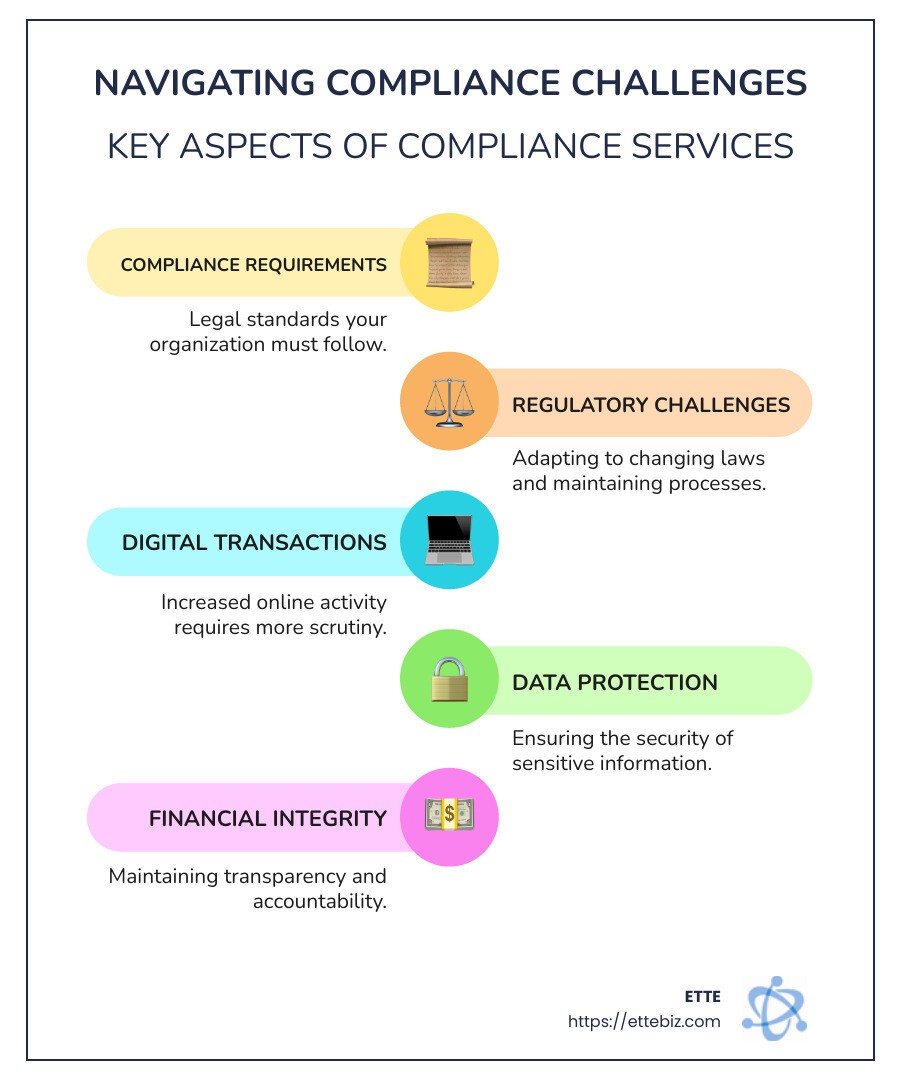Compliance Services are essential for any organization that aims to meet legal obligations efficiently. They help companies steer the complex world of regulatory challenges, especially as digital transactions rise. Understanding compliance requirements is key to staying on the right side of law and maintaining your organization’s reputation.
- Compliance Requirements: These are the legal standards and regulations your organization must follow.
- Regulatory Challenges: These include keeping up with changing laws and adapting your processes to stay compliant.
- Digital Transactions: Increasing online activities have led to more scrutiny, making compliance more critical than ever.
Businesses face a constantly changing landscape of rules and regulations. With each transaction, the potential for regulatory oversights grows, making effective compliance services more important than ever. Whether it’s data protection, financial integrity, or operating standards, staying compliant is a non-negotiable aspect of doing business.

Understanding Compliance Services
Key Components of Compliance Services
Compliance Services provide the backbone for ensuring that organizations meet their legal and regulatory obligations. They encompass several key components that work together to manage risks and maintain compliance:
-
Policies and Procedures: These are the foundational elements that guide an organization’s actions. They outline the rules and processes that employees must follow to ensure compliance with legal standards. Clear policies help prevent misunderstandings and reduce the risk of non-compliance.
-
Auditing: Regular audits are crucial for identifying areas of non-compliance and opportunities for improvement. By systematically reviewing processes and transactions, organizations can catch issues before they become significant problems. This proactive approach helps maintain integrity and trust.
-
Data Management: Efficient data management is essential for compliance. It involves organizing, storing, and protecting data to ensure it meets regulatory requirements. Proper data management reduces the risk of breaches and ensures that sensitive information is handled correctly.
Compliance Services in Healthcare
The healthcare sector faces unique compliance challenges, especially concerning billing requirements and information privacy.
-
Billing Requirements: Healthcare providers must steer complex billing regulations, particularly when dealing with government healthcare programs. Regulatory Compliance teams assist in understanding these requirements and ensuring that claims are submitted accurately. This reduces the risk of financial penalties and improves operational efficiency.
-
Information Privacy and HIPAA: Protecting patient information is paramount. The Health Insurance Portability and Accountability Act (HIPAA) sets strict standards for safeguarding electronic protected health information (ePHI). Compliance Services in healthcare focus on training staff, developing privacy practices, and responding to privacy concerns. This ensures that patient data remains confidential and secure.

By integrating these components, organizations can effectively manage their compliance obligations, reduce risks, and maintain trust with stakeholders. As regulations evolve, staying informed and adapting strategies will be crucial for ongoing success.
Implementing Effective Compliance Strategies
Leveraging Technology for Compliance
In today’s digital world, leveraging technology is essential for effective compliance strategies. Process automation is a game-changer, allowing companies to streamline their operations and reduce human error. By automating routine tasks, businesses can focus on more strategic activities, ensuring compliance is maintained without unnecessary manual intervention.
Advanced technology and analytics play a crucial role in this change. They enable organizations to monitor and analyze vast amounts of data in real-time. This digitization of compliance processes not only improves accuracy but also provides valuable insights into potential risks and areas for improvement. With these tools, companies can proactively address compliance issues before they escalate.
Moreover, innovative pricing models allow businesses to align their compliance costs with actual results. This approach ensures that companies pay for the value they receive, making compliance more cost-effective and predictable.
Compliance Services for Small Businesses
For small businesses, compliance can be a daunting task, but it is essential for maintaining operational efficiency and gaining a competitive edge. Small businesses often lack the resources to manage compliance internally, making IT support and managed services crucial.
By outsourcing compliance tasks to specialized providers, small businesses can access the expertise they need without the overhead of a full-time staff. This not only reduces costs but also ensures that compliance is handled by experts who stay updated with the latest regulatory changes.
Additionally, embracing technology can significantly improve a small business’s compliance efforts. Utilizing cloud-based solutions and open-source software can help small businesses manage their IT expenses while maintaining compliance. These tools offer flexibility and scalability, allowing businesses to adapt quickly to changing regulations.
In the end, a strategic approach to compliance that leverages technology and expert support can help small businesses not only meet their obligations but also thrive in a competitive market. By focusing on these strategies, companies can build stakeholder trust and safeguard their reputations.
Conclusion
At ETTE, we understand the complexities of navigating compliance requirements, especially for non-profits and small businesses. Our compliance solutions are designed to simplify these challenges, allowing you to focus on what you do best—serving your community and clients.
With our strategic approaches, we help businesses integrate compliance seamlessly into their operations. By leveraging our expertise in IT support, we ensure that your systems are not only compliant but also optimized for performance. This dual focus on compliance and operational efficiency gives you a competitive edge in the digital age.
Embracing technology is at the heart of our compliance strategies. We use advanced tools to digitize compliance processes, making them more efficient and less prone to error. This digitization not only improves accuracy but also provides real-time insights into potential risks, allowing you to act swiftly and decisively.
Our approach is not one-size-fits-all. We tailor our services to meet the unique needs of each client, ensuring that compliance is not just a checkbox but a strategic advantage. By partnering with ETTE, you gain access to a team that is committed to helping you steer the changing regulatory landscape with confidence and ease.
In conclusion, compliance is more than a requirement—it’s an opportunity. With the right strategies and support, you can transform compliance from a challenge into a strength. Let ETTE guide you in building a compliant, efficient, and resilient organization that stands out in today’s competitive market.
